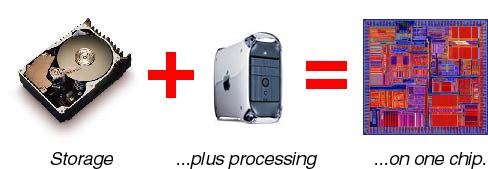Designing Systems with Mems-Based Storage

MEMS-based storage is an exciting new technology that could provide significant performance gains over current disk drive technology and at costs much lower than EEPROM technology. Based on MEMS (MicroElectroMechanical Systems), this non-volatile storage technology merges magnetic recording material and thousands of recording heads to provide storage capacity of 1-10 GB of data in under 1 cm^2 area with access times of under a millisecond and streaming bandwidths of over 50 Mbytes per second. Further, because MEMS-based storage is built using photolithographic IC processes similar to standard CMOS, MEMS-based storage has per-byte costs significantly lower than DRAM and access times an order of magnitude faster than conventional disks.
Another interesting aspect of MEMS-based storage is its ability to incorporate both storage and processing into the same chip. Because MEMS-storage is CMOS-based, it is possible to integrate several microprocessors or hundreds of custom computational engines (e.g., MPEG encode/decode, cryptography) directly with the storage device. This integration will significantly improve performance, power consumption, and cost. More importantly, it will lay the foundation for a single computing brick that contains processing and both nonvolatile and volatile storage. Developing these concepts is the central focus of a research center at CMU called CHIPS.
Although MEMS-based storage devices may still be several years away from commercialization, their potential impact in reducing the memory gap makes them an important technology for systems designers' consideration. Therefore, we have begun the exploration process, seeking an understanding of how MEMS-based storage can improve application performance and how different MEMS device characteristics can fundamentally change the behavior and design of storage systems. Our early results indicate that MEMS-based storage can significantly reduce application I/O stall times for a set of five file system and database workloads. The resulting speedups for these applications are around 5X, depending mainly on the ratio of computation to I/O. Ongoing work refines the device models, explores how they should change system architectures and memory hierarchies, and investigates newly-enabled applications.
To ensure that our models of MEMS-based storage accurately reflect
potential implementations, we work closely with a group of researchers
who are actively building MEMS-based storage devices. This collaboration
allows us to explore the system-level impact of various types of MEMS-based
storage, evaluating which physical design trade-offs (e.g., acceleration
speed, velocity, size, capacity) are most important across a range of
applications. In turn, our results feed back to the MEMS researchers,
focusing their attention on design parameters that significantly impact
system-level performance and avoiding optimizations that provide little
real benefit.
People
FACULTY
STUDENTS
John Griffin
Steve Schlosser
Publications
- Timing-accurate Storage Emulation: Evaluating hypothetical storage components in real computer systems. John Linwood Griffin. Carnegie Mellon University Ph.D Dissertation. CMU-PDL-04-108, September 2004.
Abstract / PDF [16M]
- Using MEMS-based Storage Devices in Computer Systems. Steven W. Schlosser. Carnegie Mellon University Ph.D Dissertation. CMU-PDL-04-104, May 2004.
Abstract / PDF [1.1M]
- MEMS-based storage devices and standard disk interfaces: A square
peg in a round hole? Steven W. Schlosser, Gregory R. Ganger. Proceedings
of the 3rd USENIX Conference on File and Storage Technologies (FAST
'04). San Francisco, CA. March 31, 2004. Supercedes Carnegie Mellon
University Parallel Data Lab Technical Report CMU-PDL-03-102, December,
2003.
Abstract / Postscript [2.8M] / PDF [156K]
- Exposing and Exploiting Internal Parallelism in MEMS-based Storage.
Steven W. Schlosser, Jiri Schindler, Anastassia Ailamaki, Gregory
R. Ganger. Carnegie Mellon University Technical Report CMU-CS-03-125,
March 2003.
Abstract / Postscript [1.67M] / PDF [136K]
- Timing-accurate Storage Emulation. John Linwood Griffin,
Jiri Schindler, Steven W. Schlosser, John S. Bucy, Gregory R. Ganger.
Conference on File and Storage Technologies (FAST) January 28-30,
2002. Monterey, CA. Also available as CMU SCS Technical Report CMU-CS-01-146.
Abstract / Postscript [464K] / PDF [102K]
- MEMS-Based Integrated-Circuit Mass-Storage Systems. L. Richard
Carley, Gregory R. Ganger and David F. Nagle. COMMUNICATIONS OF THE
ACM November 2000, Vol.43, No.11.
Abstract / pdf format [564K] - Operating System Management of MEMS-based Storage Devices. Griffin, J.L., Schlosser, S.W., Ganger, G.R. and Nagle, D.F. Proceedings
4th Symposium on Operating Systems Design & Implementation (OSDI 2000),
San Diego, CA, October 23-25, 2000. Also available as CMU SCS Technical
Report CMU-CS-00-136.
Abstract / Postscript [2.2M] / pdf format [336K]
- Designing Computer Systems with MEMS-based Storage. Schlosser,
S.W., Griffin, J.L., Nagle, D.F. and Ganger, G.R. Proceedings 9th
International Conference on Architectural Support for Programming
Languages and Operating Systems (ASPLOS-IX), Cambridge, MA, November
13-15, 2000. Also available as CMU SCS Technical Report CMU-CS-00-137.
Abstract / Postscript [2.7M] / pdf format [485K]
- Modeling and Performance of MEMS-Based Storage Devices. Griffin,
J.L., Schlosser, S.W., Ganger, G.R. and Nagle, D.F. Proceedings of
ACM SIGMETRICS 2000, Santa Clara, California, June 17-21, 2000. Also
available as CMU SCS Technical Report CMU-CS-00-100.
Abstract / Postscript [3.4M] / pdf format [311K]
- Filling the Memory Access Gap: A Case for On-Chip Magnetic Storage. Schlosser, S.W., Griffin, J.L., Nagle, D.F. and Ganger, G.R. CMU SCS
Technical Report CMU-CS-99-174, December 1999.
Abstract / Postscript [3.1M] / pdf format [398K]
Links
Acknowledgements
We thank the members and companies of the PDL Consortium: Amazon, Bloomberg LP, Datadog, Google, Intel Corporation, Jane Street, LayerZero Research, Meta, Microsoft Research, Oracle Corporation, Oracle Cloud Infrastructure, Pure Storage, Salesforce, Samsung Semiconductor Inc., and Western Digital for their interest, insights, feedback, and support.